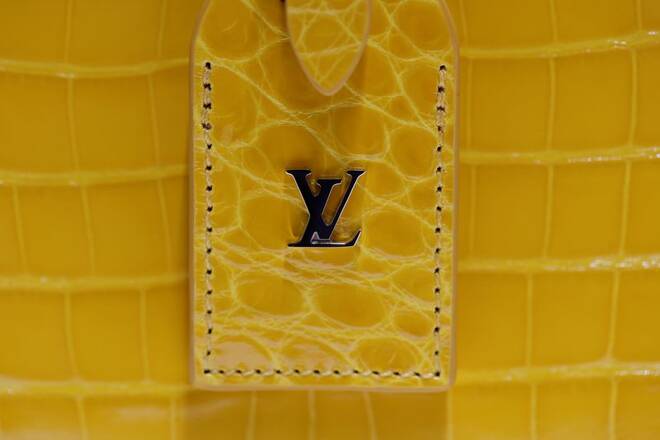Advertisement
Advertisement
Dior, Louis Vuitton power first-quarter sales at LVMH
By:
PARIS (Reuters) - Strong demand for Louis Vuitton and Dior products helped lift first quarter sales at the world's largest luxury goods conglomerate LVMH, showing the sector's resilience despite geopolitical tensions and volatile stock markets.
By Mimosa Spencer
PARIS (Reuters) -Robust demand for Louis Vuitton and Dior products boosted first-quarter sales at the world’s largest luxury goods conglomerate LVMH, kicking off earnings season for the industry with a show of resilience despite geopolitical tensions, COVID-19 lockdowns in China and volatile stock markets.
High-end fashion brands drove a 30% rise in sales of its largest division, fashion and leather goods, on a like-for-like basis, beating analyst expectations of 17%, according to consensus estimates cited by RBC.
“The year starts on a high note,” said Luca Solca of Bernstein, citing “another material beat” of consensus expectations, particularly the fashion and leather goods activity.
Dior and Celine grew faster than other labels, while Louis Vuitton “is never very far from the average for the division,” LVMH Chief Financial Officer Jean-Jacques Guiony told analysts in a call.
The group will continue to raise prices at its fashion labels – but reasonably – to reflect the cost of business, said the executive.
Luxury industry prices have increased over the last six months by around 8 percent since September last year, with hikes in the range of 20%-23% at Louis Vuitton and Tiffany, according to recent estimates from HSBC.
Watches and jewellery labels also performed strongly, with sales for the high end products up 19%, boosted by Tiffany, particularly in the United States. The American luxury brand is undergoing a renewal drive led by its new French owner targeting younger audiences, with marketing campaigns featuring K-pop star Rose wearing chunky gold jewellery.
Traffic in Sephora stores in the U.S. and France helped push up sales at the selective retail division, which clocked 24% organic sales growth. But the luxury group’s DFS travel retail business continued to suffer from travel restrictions in Asia, including Hong Kong where tourists have not yet returned.
Turnaround efforts at DFS could help it break even this year, predicted Guiony.
The executive sought to reassure investors concerned about disruptions in China from restrictions aimed at preventing the spread of coronavirus, although he cautioned that in addition to lockdowns in Shanghai and Shenzhen, traffic is down in cities that are not affected by such measures, with people travelling less.
“Obviously this is an impact – it’s a fairly recent impact so you don’t see it in the numbers,” he said, noting that the effects seen in April so far are similar to the second half of March. Drawing on experience from previous lockdowns in China, the executive predicted that demand would return quickly once restrictions ease.
“It is probably worth looking beyond 2Q China disruption,” said Citi, which plans to retain a buy rating on shares. Overall sales at LVMH rose by 23% on a like-for-like basis, which strips out the effect of currency changes, in the three months to March to 18 billion euros, beating a consensus estimate for 18% growth, cited by Jefferies.
Hermes reports first-quarter sales on April 14 and Kering on April 21.
(Reporting by Mimosa Spencer; editing by David Evans; Editing by David Gregorio, Bernard Orr)
About the Author
Reuterscontributor
Reuters, the news and media division of Thomson Reuters, is the world’s largest international multimedia news provider reaching more than one billion people every day. Reuters provides trusted business, financial, national, and international news to professionals via Thomson Reuters desktops, the world's media organizations, and directly to consumers at Reuters.com and via Reuters TV. Learn more about Thomson Reuters products:
Latest news and analysis
Advertisement
